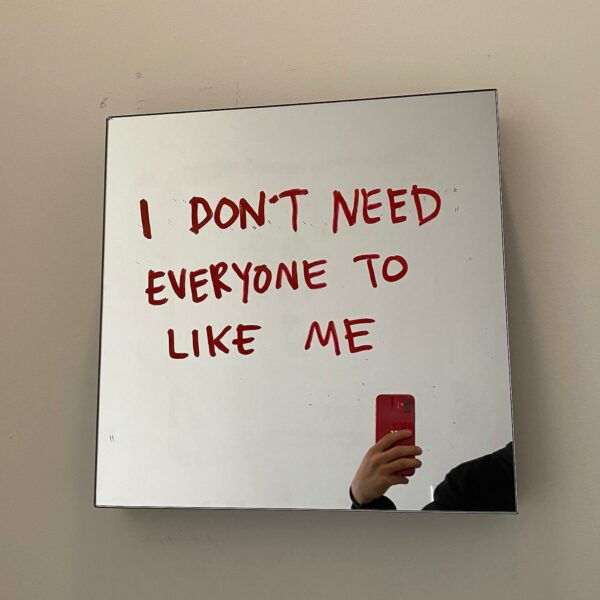Compassion can be a tricky subject. When talk therapy originated, it centered around discussion, dissection, hidden meanings, and analytics. But humans don’t operate on such a simplistic scale. Failures are unavoidable. Fumbles, many. Miscommunication, inevitable. How we exhibit compassion for ourselves and others can have the power to shift our perspectives about our relationships and peers in a way that brings great relief, joy, and peace.
We spoke with our love Gabby Bernstein, who is a spiritual guide, manifestation guru, best-selling author, and speaker on this delicate yet weighty topic. She understands compassion the way that we want to learn how to—its power.
“Compassion is a power we can all cultivate. This practice comes more easily to some people than others, and that’s OK. Honor your process. My therapist once helped me recognize that whenever I’m lacking self-compassion, it’s because in some way I feel unlovable or not good enough. This idea was alarming at first because it forced me to face my deep feelings of shame and inadequacy. But the more I thought about it, the more I accepted she was right.
Why would I attack myself if deep down I didn’t feel lovable or good enough? With this realization, I faced my innocence. The child part of myself in some way picked up a story that she wasn’t lovable. That she wasn’t good enough. As I pondered the effect this had on my child self, I began thinking about my own son, Oliver. I started to think about how I would speak to my son if he told me he felt unloved or unworthy. What kind of energy, love, connection, and compassion would I show him? What words would I use, and what positive self-talk would I encourage? How would I teach him to compassionately love himself?”
One of the first things to think about when considering self-compassion is this: would we think it was horribly cruel of us to speak to someone else the way we speak to ourselves in our internal dialogue?
Bernstein reflects further when she shares that “recognizing how I would mother my son helped me realize that I wasn’t mothering myself that same way. Why wouldn’t I give myself the same love and compassion that I would unequivocally give my son? You would never speak to a child the way you speak negatively to yourself. This realization led me to put the Message into motion and direct my compassion toward myself. I devoted time each day to this practice, and it transformed me. It gave me a new sense of safety, inner peace, and self-love. It became easier to release the cycle of negative self-talk, and it made me more consciously compassionate toward others.
This miracle of self-compassion is available to you now. Ask yourself this: How would you speak to an innocent child if they were coming out of a meltdown? Think about the loving words and energy you would offer them. What tone would you take with them? Would you slow down your breath and focus your attention on them? Consider all the ways you’d extend loving compassion to a child. Then apply this same degree of love to yourself.
Take a moment to write down some ways you could speak to yourself compassionately. For instance, when I notice myself stuck in a negative thought pattern or self-judgment, I allow myself to feel the feelings of rage and anger. I honor those feelings and ask myself, ‘In what ways do I feel unlovable or not good enough at this moment?’ Upon realizing these feelings, I compassionately guide myself back to self-love.”
It’s a very Buddhist way to understand life. The roots of the word compassion are co (with) and passion (suffering). It means to be with suffering, or suffering with others (or yourself). In deeply spiritual realms, like Buddhism, it is understood that suffering is part of life. It’s the human experience, and that’s what makes it beautiful and gives life meaning.
Bernstein shares her tactic: “I’ll say something like, ‘Gabby, here’s your wound again. You’re uncomfortable with this. It’s all good. Here it is. It’s just presenting itself to you one more time so you can get closer to healing. Congratulations for having the willingness and the strength to look at this wound. I love you, Gabby. You’re incredible for showing up for this.’
When I do this, my inner wisdom can come forward and show up for that weak, wounded ego part of myself that is still unable to see the light. These simple words catapult me into a place of calm. This is a practice of self-soothing, self-love, and self-compassion.
When you use loving self-talk, you will come back to a place of deep love, compassion, and peace because you’re allowing yourself to be wherever you are and experience whatever you’re experiencing. You’re not resisting. You’re trusting that the Universe is giving you what you need in order to heal.
Bring this practice into your daily life. Whenever you catch yourself in negative self-talk, follow these steps:
1. Consciously notice your negative self-talk.
2. Ask yourself, ‘In what ways do I feel unlovable or not good enough?’
3. Speak to yourself the same way you’d speak to a child.” (editor’s note: or a close friend whom you love dearly). “Be loving, forgiving, and deeply compassionate. Take as much time as you need to speak to yourself with loving kindness. Practice these three steps all throughout the day. Make it a habit to love yourself.”
It’s not just all about compassion of the self. Thinking with compassion toward others can benefit our personal feelings as well. Having compassion for a friend who wronged you, but was coming from a place of care, can help pull us out of our personal experience and replace feelings of resentment and hurt with love, understanding, and peace. Having compassion for our parents’ mistakes (they’re just people, after all, struggling, suffering, learning) can help us cleanse ourselves of harbored mistrust and pain and see them with love, too.
“Cultivating love and compassion for yourself benefits your relationships with other people, too. You’ll come to realize that the more loving and compassionate you are toward yourself, the more love and compassion you will receive from others. Other people are always reflecting back to you what you believe about yourself. If you believe you’re worthy of love, you will receive more love. When you’re compassionate toward yourself, you allow yourself to be vulnerable,” Bernstein shares.
“Your authentic truth is your magnificence, and your willingness to let the world see you in truth is your greatest contribution. People will feel closer to you in the presence of your self-love and vulnerability, and as a result, you’ll form stronger bonds and more intimate relationships. Self-compassion is one of the most important elements of a healthy relationship with yourself and others.” Thank you, Gabby. Your words are like a hug for the soul.






































